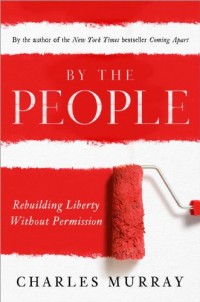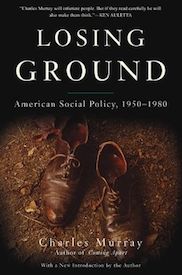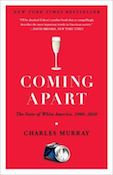By the People: Rebuilding Liberty Without Permission
“The political process in Washington is systemically corrupt in ways that make fundamental reform impossible. Not improbable but impossible.” — Charles Murray
With that truly depressing conclusion, Charles Murray cheerfully sets out to redeem the irredeemable and to fix problems that cannot be fixed.
The good news is that if any theoretical-analytical scholar is equipped, intellectually and rhetorically, to take on so effectively the great political crisis of our lifetimes, few other than Mr. Murray are up to the call.
Mr. Murray does not argue merely that the outcome of modern federal governance has been disastrous—of that there can be no serious dispute—but more crucially that the very legitimacy of the contemporary federal government has vanished.
In making his case for what is broken, Mr. Murray appeals to the great sweep of history’s champions of freedom and government restraint, from philosophers to presidents to foreign observers. We get modern theorists, case law, statistics, graphs, charts—heavy stuff at times, but not so much that it can’t be absorbed and digested by the “ordinary American” who aspires to participate in some way toward the betterment of his or her political society.
Nor is By the People mere theory, idle speculation, but rather a spiritual call to arms, as it were, to…well, whom, exactly? Mr. Murray settles on “Madisonians” as the most broadly inclusive term for avowed advocates of explicitly limited government, but he also, with generous good-faith and goodwill, casts the net of his potential readership wide, to include centrists and moderate liberals who share many of the same premises and frustrations as libertarians and those on “the right”.
We see the ways, institutional, intellectual, and social, that the United States devolved from a nation “where no American political party disputed the sovereign freedom of the individual and strict limits on the legitimate authority of the national government”, to the “arbitrary and capricious” incipient tyranny that we have today—born in large part from a twentieth-century misplaced deference to “experts” by the general public, not just the courts. We have ceded legislative, investigative, enforcement, judicial, and sentencing functions to the regulatory agencies, in disregard of Constitutional delegations of powers, as well as simple prudence about human nature.
All of this leads to a conflicting, and conflicted relationship between citizen and state: On the one hand, Mr. Murray cites a 2014 poll revealing that only 13 percent trust the federal government; but he also reports on the perceived impression, probably correct, that a plurality or even perhaps a majority of the U.S. citizenry increasingly benefit from federal transfer payments—hence, the inevitable impasse, the “sclerosis”, in ever electing more than a small number of “Madisonians”, principled fiscal conservatives, to Congress; let alone reigning in the hated bureaucracy, the courts, and the executive branch that perpetuate this state of affairs (helped along by the mushrooming lawyer industry that feeds off of it—and the “factions” of which James Madison himself warned).
So if the “normal political process” won’t bring back the historic deference to our inalienable rights…what will?
Particularly intriguing is Mr. Murray’s call for a mammoth citizens’ legal-defense fund, and professional insurance against capricious and bullying regulatory over-reach, each forcing the federal judiciary to “reform or be overwhelmed”.
Will it succeed? Mr. Murray remains optimistic that we are in a “propitious moment” that favors the reclaiming of liberty—of “putting government into its proper box”—for several reasons, including: the “cultural sorting” of an ethnically and economically diversified nation that is naturally suited to a non-intrusive government; the ability of technology both to bypass and to expose government; a growing discontent with the twin evils of business-government collusion and government shakedown-artistry; a small but significant shift towards a “new federalism” that empowers “feisty states” in defiance of the feds; and a sluggish bureaucracy that has little will to resist serious challenges.
With some of his assessments, Mr. Murray is flat-out wrong. For example, in distinguishing the “ground rules for civil disobedience”, he asserts that resistance to the federal income tax is not a legitimate target. On the contrary, sticking it to the vile IRS is one of the easiest, and for many critically principled reasons should be one of the first courses of action! After all, if only a small percentage—say, ten—of the populace did not file and did not pay each April, the “system” would collapse; the leviathan would sink like a stone, accomplishing much of what Mr. Murray envisions in an environment of “limited resistance to the existing government”.
He also underestimates what the pitifully outnumbered minions of the bureaucracy can do to enforce compliance. Dismissing the feds’ bluster as little more than the Wizard of Oz with the curtain drawn back, he forgets that they have something the Wizard doesn’t: sociopathically trigger-happy SWAT teams and a pathological compulsion to deploy them. True, the snively little cogs cannot subjugate the pan-continental 300 million; but they can make an example out of just enough to terrify the rest of us into submission.
Additionally, while Mr. Murray is right to see great potential in corralling money, technology, and human organization, this already is something that the Left does very, very well. For every gain that “Madisonians” make in the direction of freedom, there will be a ferocious counterattack from violent and mendacious Leftists. This is not a reason not to try, but it does require us to factor in a strategy of defense and perseverance.
But these are details of application, not refutations of the core arguments, which are pretty hard to dispute on logic and evidence—if a free and honest society truly is what you want.
Drastic times call for drastic measures, they say. How do we begin, as Mr. Murray characterizes it, fighting this “war of attrition” against the suffocating federal government; “no Gettysburgs or Yorktowns, just hundreds of hit-and-run guerilla actions”?
 Here is something worth remembering: On June 7, 1776, the Second Continental Congress passed a resolution for drafting a bold statement that was signed and issued a mere twenty-seven days later: the Declaration of Independence. Twenty-seven days.
Here is something worth remembering: On June 7, 1776, the Second Continental Congress passed a resolution for drafting a bold statement that was signed and issued a mere twenty-seven days later: the Declaration of Independence. Twenty-seven days.
Are today’s moral descendants of those fifty-six brave souls willing to take the plunge? If not, it won’t be because Charles Murray has failed to light the way.
Original CBC review written by D.C. Alan. D. C. Alan is a writer, musician, and artist in the nation’s capital. Contact D. C. Alan at dcalan1776@gmail.com.
Tags: By The People, Charles Murray
- The Author

Charles Murray
CHARLES MURRAY is the author of two of the most widely debated and influential social policy books in the last […] More about Charles Murray.
- Books by the Author

















